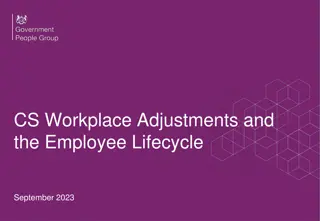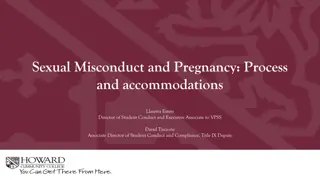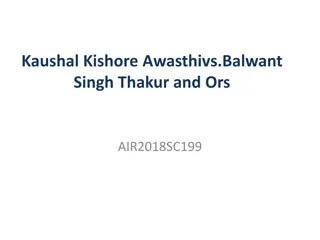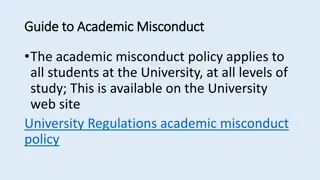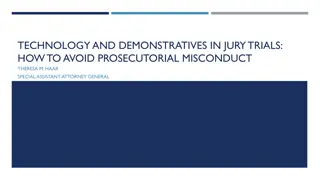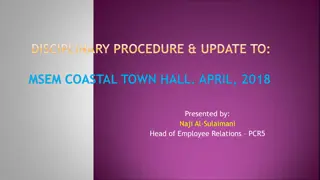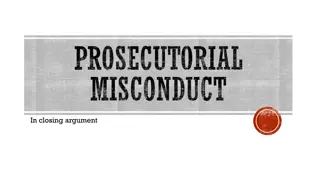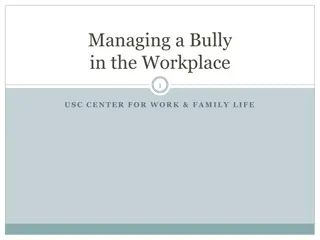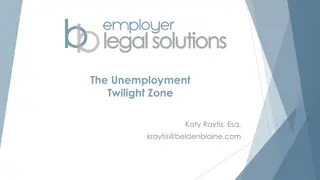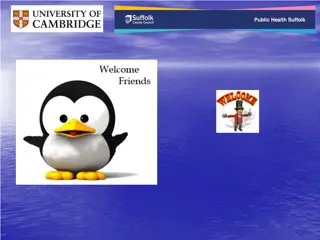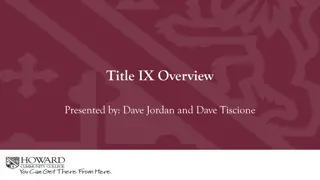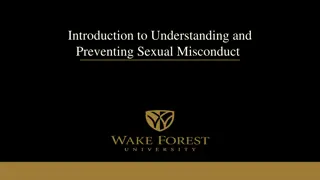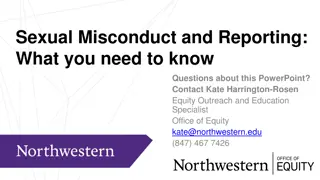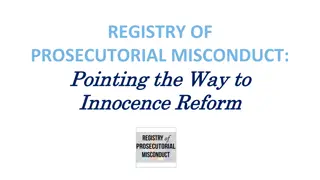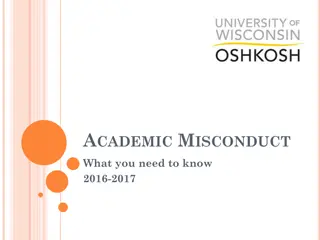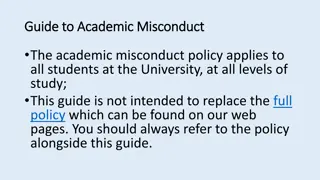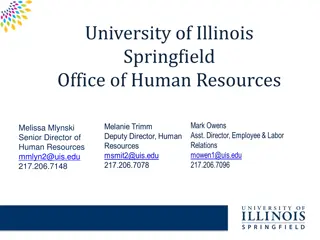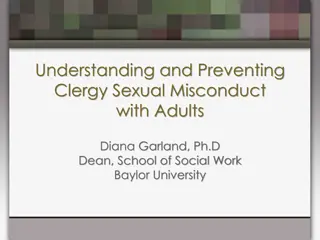Managing Misconduct and Unsatisfactory Performance in the Workplace
This presentation delves into the essential aspects that leaders need to understand about addressing misconduct and unsatisfactory performance in the workplace. It covers topics such as the distinction between misconduct and unsatisfactory performance, acknowledgement of indigenous land, process for handling such issues, challenges and rewards in performance improvement, and the importance of providing support throughout the process. The focus is on dealing with minor or lower-level matters at the local level, with serious misconduct being managed separately.
Download Presentation

Please find below an Image/Link to download the presentation.
The content on the website is provided AS IS for your information and personal use only. It may not be sold, licensed, or shared on other websites without obtaining consent from the author.If you encounter any issues during the download, it is possible that the publisher has removed the file from their server.
You are allowed to download the files provided on this website for personal or commercial use, subject to the condition that they are used lawfully. All files are the property of their respective owners.
The content on the website is provided AS IS for your information and personal use only. It may not be sold, licensed, or shared on other websites without obtaining consent from the author.
E N D
Presentation Transcript
1 Misconduct as Unsatisfactory Performance: what leaders need to know Lisa Dwiar, A/Director - Employee Relations and Bridget Partridge, Manager - Performance Improvement and Incapacity
2 Acknowledgement of Country We acknowledge this land that we meet on today is the traditional lands for Kaurna people and that we respect their spiritual relationship with their country. We also acknowledge the Kaurna people as the custodians of the Adelaide region and that their cultural and heritage beliefs are still as important to the living Kaurna people today. We also pay respects to the cultural authority of Aboriginal people attending from other areas of South Australia/Australia present here.
3 In the next hour . Misconduct or unsatisfactory performance and what process? who takes it on? local management escalation to disciplinary sanction case studies what to consider
4 Before we start .. Challenges Rewards people can and do improve not always straightforward commitment to performance improvement can effect positive change in performance development initiatives and school culture case by case no one size fits all employee willingness conversations can be difficult difficult conversations get easier with practice external involvement e.g. union/support persons students are the overall winners
5 Good news We will support you all the way! There will always be an outcome if you stick with a process Process doesn t/shouldn t take forever if it is then we need to change what we are doing We are able to modify our responses/actions as we progress depending on the circumstance Escalation is possible! Before we go any further .. Today s focus is on minor or lower level misconduct matters and unsatisfactory performance managed at the local level Serious misconduct continues to be responded to/managed by Incident Management Directorate
6 Misconduct or unsatisfactory performance? Unsatisfactory performance: when an employee is not performing the duties of their role to the required standard Performance expectations: employees technical duties and the totality of conduct in connection with their role as a public sector employee Employees may perform unsatisfactorily due to an inability, lack of application or effort or mental or physical incapacity Misconduct is unsatisfactory performance it involves either a negligent or deliberate departure from accepted ethical behavioural standards Single incidents of misconduct can be responded to as a one off but there may be times when a performance support process is more appropriate to be discussed
7 Examples Unsatisfactory Performance Misconduct When an employee is not performing the duties of their role to the required standard: Poor classroom management No evidence of differentiation Not responding to parent emails Lack of planning / programming Insufficient evidence of assessment Not engaging in PD activities Conduct that contravenes the Code of Ethics for South Australian public sector/common law principles : Not following departmental or site policy/procedures Breach of protective practices Discourteous or unprofessional behaviour Wilfully and knowingly failing to follow reasonable direction Aggression Bullying and harassment Alcohol and drug use Improper e-communications
8 What is the process? Schools and Preschools like all public sector entities have a responsibility to address performance in accordance with processes guided by the Commissioner for Public Sector Employment Unsatisfactory Performance Site managed process with targeted support from Performance Improvement and Incapacity Managed in accordance with the department s Managing Unsatisfactory Performance guideline Areas of unsatisfactory performance clearly defined and documented Opportunity to respond Clear description of expected performance Support to remedy unsatisfactory performance Timeframe for improvement Misconduct Performance Improvement and Incapacity now support leaders with minor misconduct - misconduct deemed appropriate to be managed at the site level Site based information gathering Opportunity to respond Assess the information and formulate a view Letters of reminder / direction / caution
9 IMD vs local management Lets talk responding to misconduct as a single incident locally managed
10 Managing and responding to misconduct A couple of points . It is important for leaders to manage and respond to all levels of misconduct at the time it occurs Misconduct is a very broad term and some conduct and behaviours are more serious than others and need different outcomes Misconduct that is considered as a critical incident must be reported through IRMS A critical incident is any significant unusual or threatening event that may cause disruption to a site or service, which could be contentious, create significant danger or risk, or attract media attention Not all misconduct is a critical incident to be reported on IRMS e.g. - an employee being rude to a leader one on one - probably not a critical incident - an employee being rude to a leader in front of students could be a critical incident in both cases still treat as misconduct
11 Responding to misconduct - assessment Is it misconduct? Yes departure from expected ethical behaviour standards Consider if the reported misconduct needs you to make any mandatory notifications and/or lodge an IRMS Gather student and/or staff witness accounts - document this discussion or ask them to provide their account in writing Gather any other information/relevant evidence Not enough information to substantiate the misconduct? Raise the issue with the employee and take the opportunity to remind them of their obligations under the Code of Ethics and/or Protective Practices Keep it low key conversation may be enough Keep a note . You might rely on this if a similar incident is reported again Update IRMS if necessary Let me tell you about Robin (case study)
12 Addressing the misconduct Information has been gathered Inform the employee that concerns have been raised letter/email/verbal Meet with the employee (and their support person if requested) Provide details of the alleged misconduct/incident and the information you have Provide the employee an opportunity to respond and document their response If necessary give a short deadline for a response to be given in writing Consider the employee's response against available information and make further enquires as needed Consider whether the health and wellbeing of the employee has contributed to or is responsible for the employee s conduct does this need to be addressed? Form a view and determine the appropriate outcome
13 Site managed outcomes Employee misconduct (locally managed) may be responded to with the following: A reminder written or verbal Formal directions in writing (by letter or email) Information provided of possible consequences as well as formal directions (in cases of serious or repeated behaviour) Informing the employee of their misconduct often stops further incidents Let me tell you about Toni If another incident occurs after giving formal direction not to repeat the behaviour, further escalation should be considered Escalation can result in a disciplinary sanction made against the employee Let me tell you about Dani
14 Site managed outcomes The correspondence should outline: details of the incident a summary of the alleged employee s response any relevant sections of the Code and Protective Practices any relevant standard of the Australian Professional Standards for Teachers (APST) any directions given advise the matter is considered closed and where appropriate a reminder of obligations
15 Remember that every situation is different. An informal approach to incidents through a verbal conversation with the employee may be the appropriate action. You may also feel that a follow-up email is enough if the employee shows remorse or if the misconduct is low level. Let me tell you about Scarlett If an employee denies the incident happened (but reports of similar conduct have been received previously): Consider what information is available regarding the current information as together on balance it might be reasonable for you to consider it more likely than not that the incident occurred as reported. We can assist with making such an assessment Let me tell you about Solomon
16 Recap: your reporting obligations documentation and record keeping do you have all the relevant information is needed? how will you inform the employee of the concern? allow reasonable time for employees to respond before forming your position on whether the misconduct happened apply an appropriate and proportionate outcome based on the information available a letter of direction is not a disciplinary sanction - however, you may caution the employee that a repeat of this (or similar) conduct may result in a disciplinary outcome seek support from Performance Improvement and Incapacity
17 Table Discussion So Misconduct IS unsatisfactory performance: should you run a performance support/management process? think of a time when you ve been unsure how you should respond why wasn t it straight forward? what would have helped you decide what to do?
18 Misconduct v. USP Good way to look at it: If capability/ability issues are the reason behind the misconduct support to improve possible performance support process Let me tell you about Phoenix If attitudinal single response escalate in formality if repeated remember Dani? Sometimes you have a choice i.e. lateness, unauthorised or repeated absences individual factors of the matter need to be considered Let me tell you about Joseph Responding to the misconduct as a one off in the first instance then moving into a performance support/management process might be the best course of action Let me tell you about Jasper Keep in mind - an employee behaving inappropriately in a performance support process can be issued with letters of directions while the process is in place AND - support people should be called out on any bad behaviour and can be removed from the role
19 Local Management Misconduct natural justice and procedural fairness gather information inform the employee provide opportunity to respond form a view issue letter of reminder, directions, possible consequences (escalation to disciplinary) matter closed unless it happens again
20 Local Management Unsatisfactory Performance natural justice and procedural fairness open process no surprises (how has the PDP process been used to assist the performance) sufficient evidence to commence a process under Managing Unsatisfactory Performance Guideline doesn t have to be a consensus opportunity to respond to the unsatisfactory performance clear performance expectations targeted support provided clear performance expectations opportunity to remedy unsatisfactory performance
21 Escalation to a disciplinary sanction Misconduct Disciplinary sanction can be imposed when there has been repeated instances of low level misconduct of a similar nature, which have been previously dealt with All of the information/documentation can be submitted to the CE s delegate to determine if and what sanction should be applied Unsatisfactory Performance An unsatisfactory performance process has been completed in accordance with the Managing Unsatisfactory Performance Guideline and performance has not sufficiently improved In most cases employee is directed to remain absent from site All of the information/documentation is prepared and submitted to the CE s delegate to determine if and what sanction should be applied
22 Take away Address the low level incident (misconduct) as it arises so it can be escalated if necessary If performance support process is in place and misconduct occurs during process address the conduct - if IMD become involved leader, PII and IMD work together to determine best course of action Working with Performance Improvement and Incapacity ensures that employee records are kept centrally No one size fits all but same principles are applied to misconduct and USP processes procedural fairness and natural justice Letter of direction or letter of cautioning possible consequences is not a disciplinary sanction Employee still needs opportunity to respond even if its being locally managed
23 Take away Issuing letters/emails are important as they build the case for escalation where there are repeated concerns Rude and disagreeable behaviour is misconduct but as a single incident may not warrant a disciplinary sanction. However, this may be the outcome where there is a pattern of behaviour and incidents that have been locally managed Persistence and planning is key to a successful outcome Share the load and seek support Be prepared to have the difficult conversations
24 Thanks for having us today Contact details Performance Improvement and Incapacity Ph: 8226 1899 education.performanceandincapacity@sa.gov.au Manager Assist through EAP providers Corporate Health Group 1300 870 147 ACCESS Programs 1300 667 700 Benestar 1300 360 364 Human Psychology 1300 277 924


